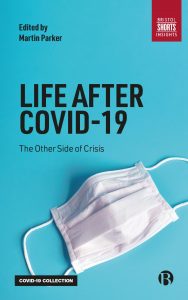By Martin Parker
A year or two ago, before the virus, I wrote a chapter for a book about hope and the social sciences. It has always seemed to me that some sort of faith in a different, better world was at the heart of what it meant to study human beings. If we are doomed to carry on being violent greedy apes, then why bother to investigate social class, patriarchy, imperialism, carbon capitalism and so on? All our studies would just be documents of failure, testaments to hopelessness. I argued that if there is a politics to social science, it must be a progressive one, a painful crawl towards less cruelty and stupidity.
So earlier this year, when the virus began to sweep across the world, I thought a lot about hope, and about the idea that this was a moment when we could reset our economy and head in some greener, fairer and more inclusive directions. There was lots of this sort of thinking around back in the spring, suddenly silent enough to hear the birds. People were writing about the virus being the opportunity for a ‘reset’, that there should be ‘no going back’, and many carbon-based businesses should be ‘closed for good’. Breathless with optimism, I put together a quick edited book, with chapters exploring what ‘Life after Covid’ might look like, in the lengthening shadow of global heating and the collapse of entangled ecosystems.

Now, already, that book seems like a historical document, a testament of youth. There are traffic jams on the motorways, and we continue to buy things we want but don’t need. It would be easy to sink into despair, to imagine that the vested interests that shape our world are too addicted to cheap energy and cheap money to contemplate systemic change. If a shock as big as covid can’t elbow us onto a new path, then let the waters rise and let the wind blow. And this time, no ark will be big enough to save us.
The virus is ‘zoonotic’, which is to say, it has jumped from animals to humans. A mutant that has moved from ‘them’ to ‘us’, like a creature in a 1950s SF film. Yet the very idea of zoonosis relies on a predictable separation between humans and the rest of the zoo, as if ‘we’ were not already ‘them’. This version of species apartheid is understandable, given that homo sapiens is likely to see the world through its own eyes, but it will not help us understand what we must do now.
Can we imagine a hope which isn’t just about humans and their desires? It seems to me that there is an opposite form of zoonosis required now, an intellectual jump that affirms our absolute entanglement with the non-human world. This is as true of the 0.1 micron virus as it is of the gigantic blue dot that we live on. We are not perched on top of the ‘great chain of being’, masters of all we survey, just one part of it all.
Let’s call this ‘homonosis’, the recognition that human pathologies do harm to other animals and plants. We are the virus, the infectious agent which is reshaping the globe to suit its needs. This reframing, that ‘we’ are ‘them’ too, should not be news to us. Pre-industrial peoples, spiritual traditions and countless scientists have known it for many years. The problem is that our economic system trades on the idea that the non-human is merely resource and dump. It is a humanist system, one that projects our particular hopes onto a world that could carry on very nicely without us.
So if we want to express a non-humanist hope for change, it is going to need to begin with the idea that all economic transactions must be circular, regenerative. They cannot begin or end with us. Any form of production, transportation or consumption which does not fully deal with its externalities will have to end. The economy needs to swallow its own smoke. So just as we collectively no longer
tolerate the production of CFCs and the hole in the ozone layer has been shrinking, so will the production of greenhouse gases simply have to end, globally. It is as simple, and as complicated, as that.
This isn’t hope in the sense of believing that the clever scientists will work something out. Its not a hazy version of utopia, or a vague description of kindly humans as stewards of Gaia. Its hope in the sense of an understanding that there is work to be done to prevent one species from destroying lots of others. These are practical matters, not pipe dreams. Ernst Schumacher of ‘Small is Beautiful’ fame completed his final book ‘A Guide for the Perplexed’ in 1977, just before he died. He concludes like this –
‘Can we rely on it that a 'turning around' will be accomplished by enough people quickly enough to save the modern world? This question is often asked, but whatever answer is given to it will mislead. The answer 'Yes' would lead to complacency; the answer 'No' to despair. It is desirable to leave these perplexities behind us and get down to work.’
Shall we get to work then? There is much to do, and its too important to be left to hope.

